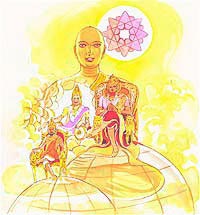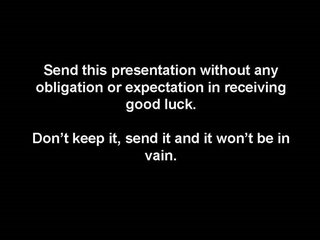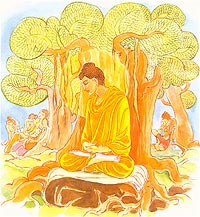Question:
What you said so far is very interesting to me. How do I become a Buddhist?
Answer:
Once there was a man called Upali. He was the follower of another religion and he went to the Buddha in order to argue with him and try to convert him. But after talking to the Buddha, he was so impressed that he decided to become a follower of the Buddha. But the Buddha said:
"Make a proper investigation first. Proper investigation is good for a well-known person like yourself."
"Now I am even more pleased and satisfied when the Lord says to me: 'Make a proper investigation first.' For if members of another religion had secured me as a disciple they would have paraded a banner all around the town saying: 'Upali has joined our religion.' But the Lord says to me: 'Make a proper investigation first. Proper investigation is good for a well known person like yourself."
MII 379
In Buddhism, understanding is the most important thing and understanding takes time. So do not impulsively rush into Buddhism. Take your time, ask questions, consider carefully, and then make your decision. The Buddha was not interested in having large numbers of disciples. He was concerned that people should follow his teachings as a result of a careful investigation and consideration of facts.
Question:
If I have done this and I find the Buddha's teaching acceptable, what would I do then if I wanted to become a Buddhist?
Answer:It would be best to join a good temple or Buddhist group, support them, be supported by them and continue to learn more about the Buddha's teachings. Then, when you are ready, you would formally become a Buddhist by taking the Three Refuges.
Question:
What are the Three Refuges?
Answer:A refuge is a place where people go when they are distressed or when they need safety and security. There are many types of refuge. When people are unhappy, they take refuge with their friends, when they are worried and frightened, they might take refuge in false hopes and beliefs. As they approach death, they might take refuge in the belief in an eternal heaven. But, as the Buddha says, none of these are true refuges because they do not give comfort and security based on reality.
Truly these are not safe refuges, not the refuge supreme. Not the refuge whereby one is freed from all sorrow But to take refuge in the Buddha, the Dhamma and the Sangha and to see with real understanding the Four Noble Truths, Suffering, the cause of suffering, the transcending of suffering and the Noble Eightfold Path that leads to the transcending of suffering, This indeed is a safe refuge, it is the refuge supreme. It is the refuge whereby one is freed from all suffering.
Dp. 189-192
Taking Refuge in the Buddha is a confident acceptance of the fact that one can become fully enlightened and perfected just as the Buddha was. Taking Refuge in the Dhamma means understanding the Four Noble Truths and basing one's life on the Noble Eightfold Path. Taking Refuge in the Sangha means looking for support, inspiration and guidance from all who walk the Noble Eightfold Path. Doing this one becomes a Buddhist and thus takes the first step on the path towards Nirvana.
Question:
What changes have taken place in your life since you first took the three refuges?
Answer:Like countless millions of others over the last 2500 years, I have found that the Buddha's teachings have made sense out of a difficult world, they have given meaning to what was a meaningless life, they have given me a humane and compassionate ethics with which to lead my life and they have shown me how I can attain a state of purity and perfection in the next life. A poet in ancient India once wrote of the Buddha:
To go to him for refuge, to sing his praise, to do him honor and to abide in his Dhamma is to act with understanding. I agree with these words completely.
Question:
I have a friend who is always trying to convert me to his religion. I am not really interested in his religion and I have told him so but he won't leave me alone. What can I do?
Answer:The first thing you must understand is that this person is not really your friend. A true friend accepts you as you are and respects your wishes. I suspect that this person is merely pretending to be your friend so he can convert you. When people try to impose their will on you they are certainly not friends.
Question:
But he says he wants to share his religion with me.
Answer:Sharing your religion with others is a good thing. But I suggest that your friend doesn't know the difference between sharing and imposing. If I have an apple, I offer you half and you accept my offer, then I have shared with you. But if you say to me "Thank you, but I have already eaten" and I keep insisting that you take half the apple until you finally give in to my pressure, this can hardly be called sharing. People like your 'friend' try to disguise their bad behavior by calling it 'sharing', 'love' or 'generosity' but by what- ever name they call it, their behavior is still just rude, bad manners and selfish.
Question:
So how can I stop him?
Answer:It is simple. Firstly, be clear in your mind what you want. Secondly, clearly and briefly tell him so. Thirdly, when he asks you questions like "What is your belief on this matter" or "Why don't you wish to come to the meeting with me", clearly, politely and persistently repeat your first statement. "Thank you for the invitation but I would rather not come". "Why not?" "That is really my business. I would rather not come." "But there will be many interesting people there." "I am sure there will be but I would rather not come." "I am inviting you because I care about you." "I am glad you care about me but I would rather not come." If you clearly, patiently and persistently repeat yourself and refuse to allow him to get you involved in a discussion he will eventually give up. It is a shame that you have to do this, but it is very important for people to learn that they cannot impose their beliefs or wishes upon others.
Question:
Should Buddhists try to share the Dhamma with others?
Answer:
Yes, they should. And I think most Buddhists understand the difference between sharing and imposing. If people ask you about Buddhism, tell them. You can even tell them about the Buddha's teachings without their asking. But if, by either their words or their actions, they let you know that they are not interested, accept that and respect their wishes. It is also important to remember that you let people know about the Dhamma far more effectively through your actions than through preaching to them. Show people the Dhamma by always being considerate, kind, tolerant, upright and honest. Let the Dhamma shine forth through your speech and actions. If each of us, you and I, know the Dhamma thoroughly, practice it fully and share it generously with others, we can be of great benefit to ourselves and others also.
'Becoming a Buddhist Chapter' from the book
'Good Question, Good Answer' by Ven S. Dhammika.
+++++++++
Technorati:
Buddhism Buddha Buddhist Dharma Compassion Wisdom Religion Meditation Zen Philosophy Spirituality Inspiration Peace Insight buddha-insight
Read more!




















